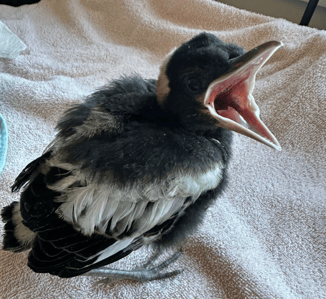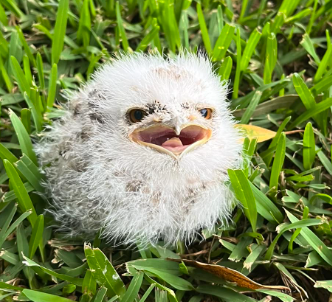Helping Chicks
- Home
- What We Do
- Wildlife Information
- General Information
- Helping Chicks
Australia boasts a staggering array of over 800 bird species, each with unique nesting behaviours and chick development.
Understanding their needs is crucial to their survival. Chicks rely on their parents for food, warmth, and protection. When separated, they become extremely vulnerable.
Chick Development Stages
Explore the important stages of chick development:
- Nestling: Fully dependent on the nest.
- Branchling: Gaining strength and skills in the safety of trees.
- Fledgling: Capable of flight but still learning.
- Juvenile: Masters the art of flying, resembling adult birds.
As chicks grow, they gradually transition to the next stage. They don't naturally fledge from the ground and may need assistance.
Nestlings
Nestling chicks on the ground need urgent help, especially if they lack feathers. Please refrain from providing food or water. Follow containment and warmth guidelines, and call WIRES urgently.
Branches and Fledglings
Branchling and fledgling chicks often find themselves in precarious situations. You may be able to help by gently placing them on a nearby tree branch. Observe from a distance for at least 30 minutes to ensure parent birds are attending. If they return to the ground and can't hop or fly up to the tree, they require rescue by a trained WIRES bird carer.
Nest Hollow Chicks
Common examples include parrots and kookaburras. Nest hollow chicks only leave their nests when they can fly. If found on the ground, please call WIRES on 1300 094 737.
Ground Nesting Chicks
Some species nest on the ground; their chicks are covered in downy feathers and become mobile shortly after hatching. Examples include Masked Lapwings, Pacific Black Ducks, and Quail. If concerned, observe from a distance; if the parent birds are still not present after 30 minutes, contain the chick securely and call WIRES.
Note: Do not place ducklings in water when they're young, as they struggle to regulate their body temperature.
Brush Turkeys


Providing Warmth for Chicks
In cases of wet, cold, or very young chicks, warmth is critical. Here's what to do:
- Fill a water bottle with warm tap water.
- Ensure the water is warm to the touch (about 37-38°C).
- Secure the bottle tightly and wrap it in a tea towel or t-shirt to prevent rolling.
- Place it near the chick, not touching.
- Cover young chicks with a soft cloth for security.
- Keep the container with the chick in a warm, dark, and quiet room.
- Contact WIRES as soon as possible, report a rescue or call 1300 094 737
15 Ways to Help Wildlife
Sign up to receive our monthly eNewsletter with wildlife rescue stories and updates on our work rescuing, rehabilitating, and releasing native wildlife.
